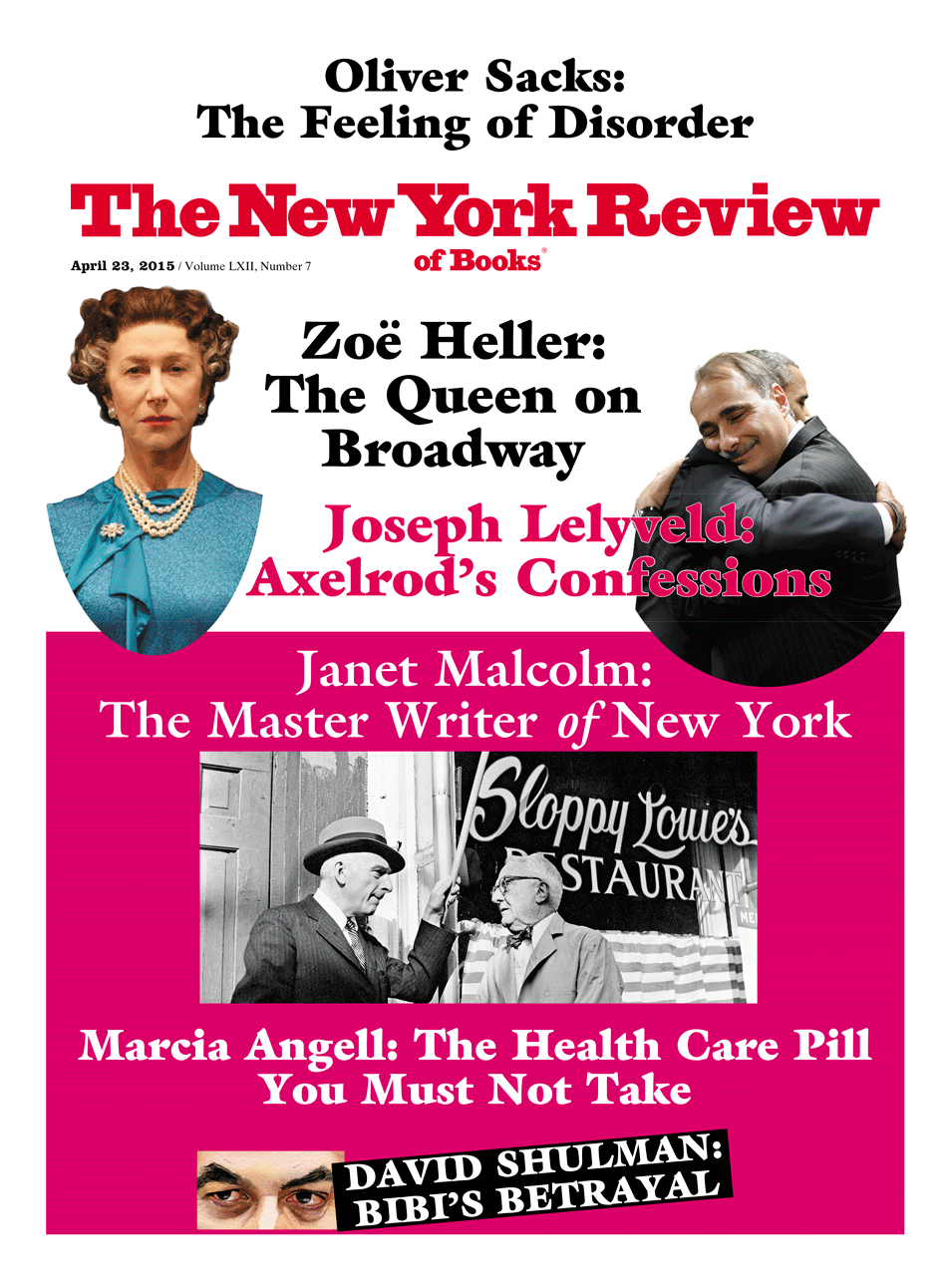In response to:
Fiddle Shtick from the December 18, 2014 issue
To the Editors:
I appreciate that Robert Brustein admired my writing and research for Wonder of Wonders: A Cultural History of Fiddler on the Roof [NYR, December 18, 2014], but am beyond bewildered that he found it “bewildering” that anyone should write seriously about the musical. Rather than take on the arc and argument of my book, he resuscitates his fifty-year-old charge that in Fiddler “the fullness and depth of the source material” was not “sufficiently preserved on the stage.” All one can say is, “Nu? Voden?” (Yes, and so…?) Such are the perils of adapting work from one medium to another: the literary nuances of Sholem Aleichem’s masterful stories (which I discuss at length in my book) are lost as new musical-theatrical pleasures are found. (See Kiss Me Kate, West Side Story, Pal Joey, A Connecticut Yankee, etc.)
As I detail, the show takes liberties with the often dark stories. But rather than stop with the obvious academic point, I explore how a Broadway show, of all things, became a global touchstone for Jewish identity, ethnic cohesion, generational conflict, and origin stories, and contributed to the invention of the shtetl as an idyllic Ashkenazi memory site. From Sholem Aleichem’s own (highly melodramatic) dramatization of the Tevye stories, through many adaptations before Fiddler and since, Tevye has been a screen onto which Jews have projected their desire for a usable past. These are among my book’s themes. But you’d never know it from Brustein’s quaint effort to rescue Sholem Aleichem from the musical’s success. (Contrary to his baseless accusation that the show usurped the stories, it did much to keep English translations available; they were out of print when Fiddler’s authors set out to adapt them.)
In his ardor, Brustein gets significant facts wrong, and even makes some up—too much to detail in the space allotted here. Briefly: wrong that Sholem Aleichem returned to Ukraine after his disastrous effort to strike it rich in New York’s Yiddish theater (he went to Western Europe); wrong that Midge Decter excoriated Fiddler in the pieces cited in my book (she was discussing an earlier, nonmusical play by Arnold Perl); egregiously wrong that Sheldon Harnick rewrote his lyrics to accommodate LGBTQ, African-American, and gentile performers of the musical or that any book so claimed. (What Harnick did, bless him, was tweak “Sunrise, Sunset” for use at same-sex weddings.) Wrong that Wonder of Wonders has little to say about the show’s afterlife—a full third addresses how Fiddler found cultural utility in Israel, Poland, a predominantly African-American school in Brooklyn, contemporary pop culture, even Jewish ritual practice.
Brustein quotes, twice, from a cover note Sholem Aleichem attached to a script submitted to Jacob Adler and Boris Thomashevsky: “I will never permit myself to give in to American taste and lower the standards of art.” Brustein must have skipped the page after my reference to this letter, where I show how Sholem Aleichem followed up: he mailed off a revised draft with a new, sensationalistic fifth act that sought precisely to give in to American taste. He desperately wanted a hit.
Alisa Solomon
New York City
Robert Brustein replies:
There’s an immortal line—actually it’s from my recent Klezmer musical, The King of Second Avenue—where an actor says “I do not prostitute my art—except in starring roles.”
Surely Ms. Solomon can distinguish between the ideal and the reality when it comes to selling out. A lot of artists at one time or another—including me—have been tempted to allow his or her work to be compromised for the sake of money or celebrity, and a lot of artists—including Sholem Aleichem—have yielded to that temptation. So did Zero Mostel when asked to perform the part of Tevye in Fiddler on the Roof. Although he found the piece unworthy of his talents, his wife needed a fur coat.
Arrangements of this kind are especially seductive when money, not quality, is what a culture most values. But few authors toast the room when their work is being commercialized, no matter how much it elevates the level of their hedge funds. That Fiddler on the Roof proved to be considerably more lucrative than Tevye and His Daughters is beyond dispute. But is that a reason for a gifted drama critic such as Alisa Solomon to expend so much time, energy, and scholarship, not to mention over four hundred pages of type, over the making and marketing of a Broadway musical?
This is a particularly poignant question in an age when Shakespeare is rarely studied in the schools, when the Greek dramatists are barely staged in theaters, and when great modern playwrights cannot fairly get a hearing without the benefit of a Broadway score. As for Fiddler being a touchstone of Jewish identity, there is more authentic Jewishness to be found in the appetizer section of Zabar’s.
I apologize to readers, editors, and Ms. Solomon for any factual errors that may have slipped into my article, as, for example, whether Sholem Aleichem spent his later life in the Ukraine or in Geneva. But my central point remains that theater critics, during this sad moment in our cultural history, should be honoring the best expression of an author’s work, instead of celebrating his or her compromises, however lyrical.


